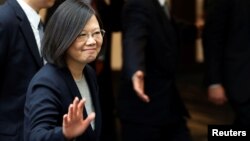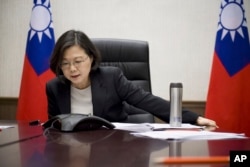Taiwan President Tsai Ing-wen is showing signs of steering a middle course between China and the United States, despite a unique connection with Donald Trump, to balance competing voter sentiments and reduce the risk of escalating anger in Beijing.
Tsai made a surprise call to Trump in December before he took office. But her government has made a series of statements over the past two weeks suggesting it wants no worsening of already strained relations with China.
“As far as Taiwan’s policy toward China, she’s been very consistent in showing goodwill, which has not been reciprocated by China,” said Ross Feingold, a Taipei-based analyst with an American political consultancy.
Tsai is moving cautiously with Washington, analysts believe, partly to avoid being used as a Sino-U.S. bargaining chip, a fate opposed by much of Taiwan’s public. Some voters also want her to keep peace with China, a top trade and investment destination with the world’s third most powerful military.
But Tsai, who is known as a cautious person, cannot veer too close to China without upsetting voters and people in her political party with staunch anti-Beijing views. China fumes when major world powers such as the United States get close to Taiwan, implying that the Asian island is a sovereign state rather than a Chinese territory.
Beijing, which has long seen self-ruled Taiwan as part of its territory, distrusts Tsai because of her refusal to hold talks with the Communist leadership with the understanding that both sides belong to one China.
“Taipei wants neither to be a bargaining chip, nor to provoke Beijing,” said Alan Romberg, East Asia Program director with Washington think tank the Stimson Center. “They do want a good relationship with the Trump Administration, so they will try to walk the fine line between forging that while at the same time avoiding being co-opted in a power game that would harm Taiwan rather than help it.”
More than a month before taking office as U.S. president, Trump accepted a 12-minute phone call from Tsai, the first such high-level contact since the 1970s. They discussed Taiwan’s security, a possible reference to its defense against China, and its hopes to be more accepted internationally.
Taiwan has just 21 diplomatic allies, mostly poor countries, compared to China’s more than 170. China also blocks Taiwan’s participation in the United Nations.
After the call and before taking office, Trump suggested that China’s policy claiming sovereignty over Taiwan was negotiable. The comment angered Beijing, which followed up by passing its aircraft carrier near Taiwan’s territorial waters, and raised concern among Taiwanese that Trump would use Taiwan’s status as a bargaining chip to get unrelated concessions from the much larger China.
On Thursday Trump agreed in a telephone call with his Chinese counterpart Xi Jinping to honor that policy.
The presidential office in Taipei responded Friday by saying Taiwan and the United States have maintained close contact with a “very good zero accident” approach. Taiwan understands that the U.S. government “attaches great importance to peace and stability in East Asia,” the office said in a statement.
“As a bargaining chip I don’t think that Taiwan is very influential or critical,” said Wu Chung-li, a political science research fellow at Academia Sinica, a university in Taipei. “And Trump is very unpredictable. You don’t know what he’s going to do, use Taiwan as a bargaining chip or just as a businessman.”
“So everything is negotiable. A couple of months ago maybe (Tsai) tried to play this U.S. ball, but obviously the response from China’s side is pretty strong.”
On January 30, Taiwan’s Mainland Affairs Council, the government agency in charge of China policy, issued a statement advocating the creation of “harmonious” relations with Beijing. On February 1 the council noted mainland Chinese graduate students’ appreciation for academic exchanges last year.
And on Wednesday the council declined to comment on a Japanese media report that China was considering changes to its Anti-Secession Law, which is aimed in part at consolidating Beijing’s rule over Taiwan.
Council Deputy Minister Chiu Chui-cheng acknowledged “uncertainty” in early 2017 and urged a “calm” approach to China in that context.
“To cope with all sorts of uncertain factors internationally, in the Asia Pacific as well as between Taiwan and mainland China, both internally and externally, our government must stay calm and rational, controlling risks and seizing opportunities and carefully promoting Taiwan-mainland policies for the development of relations,” Chiu told Voice of America.
“We hope to ease differences through dialogue and communication,” Chiu said, urging China to avoid action that might make things worse.
Taiwan has publicized no specific proposals for new U.S. ties since Trump took office January 20, nor has Trump laid out an agenda for Taiwan.
Washington switched formal diplomatic recognition from Taipei to Beijing in 1979 as the Chinese economy grew. It has maintained strong informal ties with Taiwan since then and ranks as its top weapons supplier.
Analysts expect Tsai, a 60-year-old law scholar, eventually to seek an increase in existing U.S. exchanges with Taiwan: arms sales, senior-level visits from Washington to Taipei and possibly a bilateral trade deal. The arms sales and visits would be consistent with topics discussed between Tsai and Trump by phone on December 2.
China might respond to those measures by paying off the Asian island’s diplomatic allies, cutting back two-way economic ties or making military threats. China has done all three since Tsai took office in May. But Tsai’s predecessor, and Trump’s, had also presided over arms sales and high-level visits.
“It is a normalization of interaction,” Feingold said, anticipating more exchanges like those of the past. “Whether it’s government-to-government, military-to-military, the whole panoply of interactions (is) to have a normalization.”





